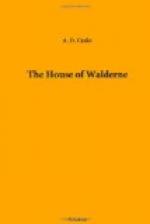“Yes, of the murder of his aunt, the late lamented Lady of Walderne.”
“Good heavens!” cried the knight and mayor.
“Oh heaven and earth, this slander hear!” said Martin.
“Do not swear, it misbecomes a friar.”
“Thou didst murder her thyself.”
“Nay: who gave her the sleeping draught the last night? I have just discovered that it contained poison supplied by the old witch who lived here, and whom I have duly punished by fire. But whose hand, administered it?”
Martin turned pale.
“I ask,” continued Drogo, “who gave her the draught?”
“It was I, but who poisoned it?”
“Satan knows best, but thou hast owned it.
“I call thee to witness, most valiant knight,
and thee, O Mayor of
Hamelsham, that you both hear him—confitentem
mum, as Father
Edmund used to say at Kenilworth.
“Ah, I have him on the hip. Away with them to Walderne: the deepest dungeon for the poisoner.”
Chapter 22: A Medieval Tyrant.
Drogo did not venture to bring in his prisoners by the light of day, for although he had collected together a large flock of black sheep, yet did he not dare openly to consign a preaching friar to those dungeons of his.
The men he had with him on the spot were certain lewd fellows of the baser sort, distinguished even in Walderne Castle for their wickedness; yet even they had their superstitions, and imagined it would bring bad luck to arrest the ecclesiastic, travelling in the garb of his order.
But Drogo’s will was law, and they obeyed. They detained the prisoners in an outlying farmhouse until dark, then thrusting a labourer’s smock over Martin’s robe, led their prisoners to the castle.
Prisoners were no novelty there, many of these free lances were born in camp, and had the inherited habits of generations of robbers, so that it was to them a second nature to mutilate, imprison, and torture, and slay. They looked upon burghers and peasants as butchers do on sheep, or rather they looked upon them as beings made that warriors might wring their hidden hoards from them, by torture and violence, or even in default of the gold hang them for amusement, or the like. They had about as much sympathy for these men of peace as the pike for the roach—they only thought them excellent eating.
As for the knight—he was a knight, and must be treated as such, although an enemy. As for the burgher—well, we have discussed the case. As for the friar—they did not like to meddle with the Church. They dreaded excommunication, men of Belial though they were.
The knight was confined in a chamber high up in the tower, from whence he could see:
The forest dark and gloomy,
And under poetic inspiration compose odes upon liberty. The burgher and friar were taken downstairs to gloomy dungeons, adjacent to each other, where they were left to solitude and silence.




